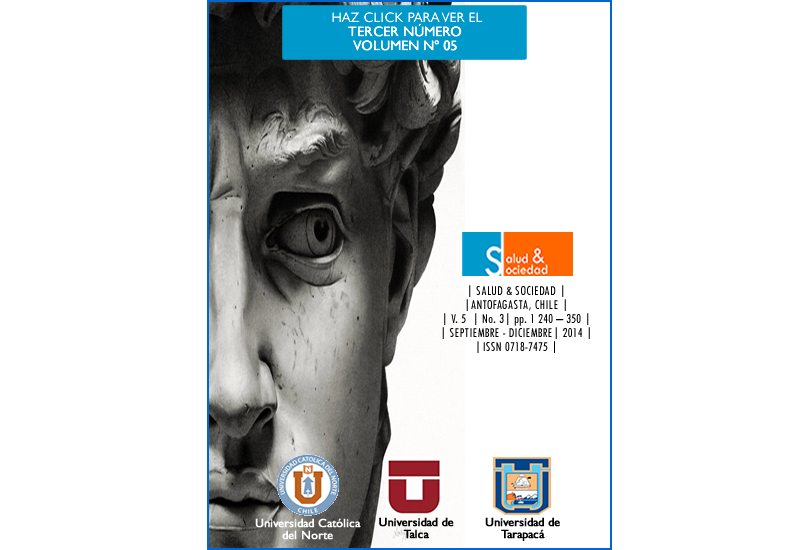Bienestar psicológico en estudiantes de la Universidad Nacional de Mar del Plata, Argentina, según la edad y el género
DOI:
https://doi.org/10.22199/S07187475.2014.0003.00003Keywords:
Psychological well-being, Age, College students, GenderAbstract
To compare (considering sex and gender) the psychological well-being of students from Universidad Nacional de Mar del Plata, Argentina. Method: van Dierendonck’s (2006) adaptation of Ryff’’s (1989) Psychological Well-Being Scales (PWB) was applied to a non-probabilistic sample of 376 regular students enrolled in various undergraduate programs from Universidad Nacional de Mar del Plata (72% women, 28% men), with a mean of 24,8 of age (DE= 6,05 years old). Results: Women expressed a higher self-perception of Personal Growth than men (U = 11800, p = .01), and adults than youngsters (U = 3942.00, p = .04). Conclusion: These results can be considered relevant enough to design intervention programs oriented to consolidate the dimensions of psychological well-being with more deficits, to optimize the availability of personal resources and improve students’ academic career.
Downloads
References
Barra, E. (2010). Bienestar psicológico y orientación de rol sexual en estudiantes universitarios. Terapia psicológica, 28(1), 119-125.
Casullo, M. M., & Solano, A. C. (2000). Evaluación del bienestar psicológico en estudiantes adolescentes argentinos. Revista de Psicología, 18(1), 35-68.
Delfino, G. I., & Zubieta, E. M. (2011). Valores y política: Análisis del perfil axiológico de los estudiantes universitarios de la ciudad de Buenos Aires (República Argentina). Interdisciplinaria, 28(1), 93-114.
García-Andalete, J. (2013). Bienestar psicológico, edad y género en universitarios españoles. Salud & Sociedad, 4(1), 48-58.
Keyes, C. L. (2002). The mental health continuum: From languishing to flourishing in life. Journal of health and social behavior, 43, 207-222.
Meléndez Moral, J. C., Tomás Miguel, J. M., & Navarro Pardo, E. (2008). Análisis del bienestar en la vejez según la edad. Revista Española de Geriatría y Gerontología, 43(2), 90-95.
Ryff, C. (1989). Happiness is not everything or is it? Explorations on the meaning of psychological well-being. Journal of Personality and Social psychology, 57, 1069-1089.
Ryff, C. & Keyes. L. (1995). The structure of psychological well-being revisited. Journal of Personality and Social Psychology, 69, 719-727.
Ryff, C. (1995). Psychological well-being in adult life. Current directions in psychological science, 4, 99-104.
Ryff, C. D., & Singer, B. (1998). The contours of positive human health.Psychological inquiry, 9(1), 1-28.
Ryff, C., & Singer, B. (2002). From social structure to biology. Handbook of positive psychology, 63-73.
Ryff, C. D., & Singer, B. H. (2008). Know thyself and become what you are: A eudaimonic approach to psychological well-being. Journal of Happiness Studies, 9(1), 13-39.
Ryff, C. D., Lee, Y. H., & Na, K. C. (1993). Through the lens of culture: Psychological well-being at midlife. Comunicación presentada en el encuentro de la Gerontological Society of America, New Orleans, LA.
Roothman, B., Kirsten, D. K., & Wissing, M. P. (2003). Gender differences in aspects of psychological wellbeing. South African Journal of Psychology, 33(4), 212-218.
Van Dierendonck, D., Abarca, A. B., Díaz, D., Jiménez, B. M., Gallardo, I., Valle, C., & Carvajal, R. R. (2006). Adaptación española de las escalas de bienestar psicológico de Ryff. Psicothema, 18(3), 572-577.
Valverde, C. V., Torres, G. H., Rahona, J. J., & Gómez, D. (2009). Bienestar psicológico y salud: aportaciones desde la psicología positiva. Anuario de psicología clínica y de la salud = Annuary of Clinical and Health Psychology, 5, 15-28.
Vleioras, G., & Bosma, H. A. (2005). Are identity styles important for psychological well-being?. Journal of adolescence, 28(3), 397-409.
Westerhof, G. J., & Keyes, C. L. (2010). Mental illness and mental health: The two continua model across the lifespan. Journal of Adult Development, 17(2), 110-119.
Zubieta, E., Fernández, O., & Sosa, F. (2012). Bienestar, valores y variables asociadas. Boletín de Psicología, 106, 7-27.
Zubieta, E., Muratori, M., & Fernandez, O. (2012). Bienestar subjetivo y psicosocial: explorando diferencias de género//Subjective and psychosocial well-being: exploring gender differences. Salud & Sociedad, 3(1), 66-76.
Downloads
Published
Issue
Section
License
Los autores continúan como propietarios de sus trabajos, y pueden volver a publicar sus artículos en otro medio sin tener que solicitar autorización, siempre y cuando indiquen que el trabajo fue publicado originariamente en Revista Salud & Sociedad (ISSNe:0718-7475).



_(1).png)





